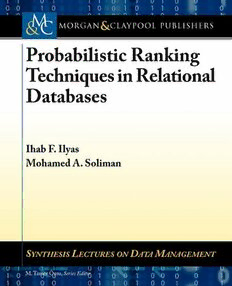Download Probabilistic Ranking Techniques in Relational Databases PDF Free - Full Version
Download Probabilistic Ranking Techniques in Relational Databases by Ihab F. Ilyas, Mohamed A. Soliman in PDF format completely FREE. No registration required, no payment needed. Get instant access to this valuable resource on PDFdrive.to!
About Probabilistic Ranking Techniques in Relational Databases
Ranking queries are widely used in data exploration, data analysis and decision making scenarios. While most of the currently proposed ranking techniques focus on deterministic data, several emerging applications involve data that are imprecise or uncertain. Ranking uncertain data raises new challenges in query semantics and processing, making conventional methods inapplicable. Furthermore, the interplay between ranking and uncertainty models introduces new dimensions for ordering query results that do not exist in the traditional settings. This lecture describes new formulations and processing techniques for ranking queries on uncertain data. The formulations are based on marriage of traditional ranking semantics with possible worlds semantics under widely-adopted uncertainty models. In particular, we focus on discussing the impact of tuple-level and attribute-level uncertainty on the semantics and processing techniques of ranking queries. Under the tuple-level uncertainty model, we describe new processing techniques leveraging the capabilities of relational database systems to recognize and handle data uncertainty in score-based ranking. Under the attribute-level uncertainty model, we describe new probabilistic ranking models and a set of query evaluation algorithms, including sampling-based techniques. We also discuss supporting rank join queries on uncertain data, and we show how to extend current rank join methods to handle uncertainty in scoring attributes. Table of Contents: Introduction / Uncertainty Models / Query Semantics / Methodologies / Uncertain Rank Join / Conclusion
Detailed Information
| Author: | Ihab F. Ilyas, Mohamed A. Soliman |
|---|---|
| Publication Year: | 2011 |
| ISBN: | 9781608455676 |
| Pages: | 81 |
| Language: | English |
| File Size: | 2.899 |
| Format: | |
| Price: | FREE |
Safe & Secure Download - No registration required
Why Choose PDFdrive for Your Free Probabilistic Ranking Techniques in Relational Databases Download?
- 100% Free: No hidden fees or subscriptions required for one book every day.
- No Registration: Immediate access is available without creating accounts for one book every day.
- Safe and Secure: Clean downloads without malware or viruses
- Multiple Formats: PDF, MOBI, Mpub,... optimized for all devices
- Educational Resource: Supporting knowledge sharing and learning
Frequently Asked Questions
Is it really free to download Probabilistic Ranking Techniques in Relational Databases PDF?
Yes, on https://PDFdrive.to you can download Probabilistic Ranking Techniques in Relational Databases by Ihab F. Ilyas, Mohamed A. Soliman completely free. We don't require any payment, subscription, or registration to access this PDF file. For 3 books every day.
How can I read Probabilistic Ranking Techniques in Relational Databases on my mobile device?
After downloading Probabilistic Ranking Techniques in Relational Databases PDF, you can open it with any PDF reader app on your phone or tablet. We recommend using Adobe Acrobat Reader, Apple Books, or Google Play Books for the best reading experience.
Is this the full version of Probabilistic Ranking Techniques in Relational Databases?
Yes, this is the complete PDF version of Probabilistic Ranking Techniques in Relational Databases by Ihab F. Ilyas, Mohamed A. Soliman. You will be able to read the entire content as in the printed version without missing any pages.
Is it legal to download Probabilistic Ranking Techniques in Relational Databases PDF for free?
https://PDFdrive.to provides links to free educational resources available online. We do not store any files on our servers. Please be aware of copyright laws in your country before downloading.
The materials shared are intended for research, educational, and personal use in accordance with fair use principles.

